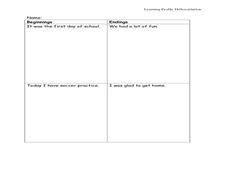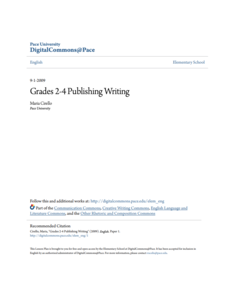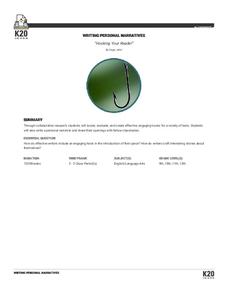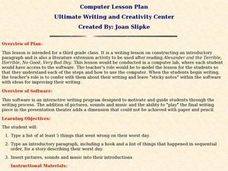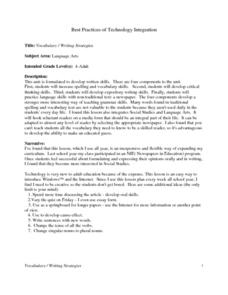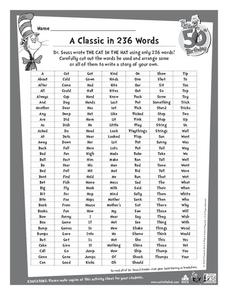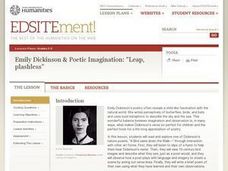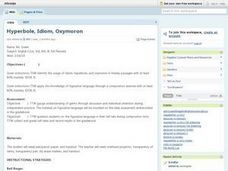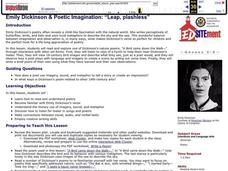Curated OER
Using Opening Lines as Writing Prompts
Help your writers get started with these hooks! Twenty-five opening lines from the "Lives" column in the New York Times Magazine act as prompts for creative writing. Have your learners choose one prompt and write an original essay....
Curated OER
Harmony and Expression in Writing Form
How do you write an interesting beginning, middle, and end of a story? With this lesson, young writers look to other stories as examples. Then, they use some of the attached graphic organizers to help them create their own story. Note:...
EngageNY
Revising My Accessing Books Around the World Informative Paragraph for a Hook to Captivate My Reader
While this is considered optional within the unit it is designed for, pupils would benefit from the listed activities. Working on writing and revising a paragraph about librarians who travel to isolated areas, class members can add some...
Pace University
Publishing Writing
Scholars become familiar with tagline literature with the help of the story, Alexander and the Horrible, No Good, Very Bad, Terrible Day by Judith Viort. After a read-aloud and whole-class discussion, leveled groups complete...
Civil War Trust
Civil War Newspaper
One photograph can represent so much more than the images on the film. Eighth graders select a photograph from the Civil War era and conduct additional research based on the subject matter from the picture. Once they complete the...
Curated OER
It's a Matter of Opinion
Dissect the parts of an advertisement with your class. Middle schoolers discuss advertisements and locate the hook in them. Then, they create an advertisement for a business, in which they include the name of the business, an...
K20 LEARN
Hooking Your Reader
Hook your class into inquiry-based, hands-on learning with a activity on narrative leads. Pupils research different types of hooks and decide which one to use in their own writing. Carefully scaffolded to include all learners, the...
Curated OER
"Leap, plashless": Emily Dickinson & Poetic Imagination
Learners examine different poems from Emily Dickinson. They practice listening for meter in the poems and make connections between the texts. They also practice their own creative writing skills.
Curated OER
Ultimate Writing and Creativity Center
Third graders engage in a writing lesson on constructing an introductory paragraph and is also a literature extension activity to be used after reading Alexander and the Terrible, Horrible, No Good, Very Bad Day.
Curated OER
Vocabulary / Writing Strategies
Students will increase spelling and vocabulary skills. Then they will develop critical thinking skills. Next, they will develop expository writing skills. Finally, students will practice language skills with non-traditional text: a...
Curated OER
Rhythm and Improv, Jazz and Poetry
Connect the ideas of jazz improvisation and art to writing poetry. Learners collaborate and write different lines of poetry, imitating the jazz styles of improvisation and freewriting. Take a close look at the poems "Tenebrae" by Yusef...
Seussville
A Classic in 236 Words
Get in the reading spirit on Read Across America Day while celebrating Dr. Seuss' birthday with four printable worksheet activities. Included is a word search using story character's names, a quiz to test how many Dr. Seuss titles you've...
Curated OER
Emily Dickinson & Poetic Imagination: "Leap, plashless"
Students analyze the poems of Emily Dickinson and write their own nature poem. In this poetry analysis lesson, students read Dickinson poetry and analyze the use of imagery, sound, and metaphor. Students write their own nature poem using...
Curated OER
Hyperbole, Idiom, Oxymoron
Fourth graders identify the usage of idiom, hyperbole, and oxymoron in literary passages. They apply this knowledge of figurative language through a composition exercise. The writing of teacher generated examples is also helpful.
Curated OER
"Leap, Plashless": Emily Dickinson & Poetic Imagination
Students read and explore one of Emily Dickinson's nature poems, "A Bird Came Down the Walk-" through interaction with a variety of art forms. Clips of a hymn to hear meter and the viewing of bird images exposes them to the language and...
Salmon Schools
Presentation Preparation Guildeline
What's next? Once seniors have completed a job exploration project (or any project for that matter) they prepare a speech for judges in which they describe their project, reflect on what have learned about the subject, and what they...
Film Education
The Jungle Book
Accompany a viewing of Disney's live-action feature film, The Jungle Book, with a packet equipped with several activities focused on story elements. Scholars discuss and complete diagrams and charts about the movie's characters, setting,...
Curated OER
Censorship In Fahrenheit 451
Tenth graders explore the concept of censorship through a reading of Fahrenheit 451. They discuss the issue and its relation to contemporary society. Students work in groups to debate the pros and cons of censorship in our society.
Curated OER
Author Study
Students examine and identify the characteristics of the different genres of literature. After being read and reading various stories, they identify how different books by the same author carry the same story elements. They discuss how...
Curated OER
Monster Dictionary
Third graders explore several retrieval strategies to find information in a variety of sources. They organize the information they find and create a Monster Dictionary that includes imaginary monsters and their definitions.



